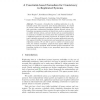Free Online Productivity Tools
i2Speak
i2Symbol
i2OCR
iTex2Img
iWeb2Print
iWeb2Shot
i2Type
iPdf2Split
iPdf2Merge
i2Bopomofo
i2Arabic
i2Style
i2Image
i2PDF
iLatex2Rtf
Sci2ools
124
Voted
OPODIS
2004
2004
A Constraint-Based Formalism for Consistency in Replicated Systems
Abstract. We present a formalism for modeling replication in a distributed system with concurrent users sharing information. It is based on actions, which represent operations requested by independent users, and constraints, representing scheduling relations between actions. The formalism encompasses semantics of shared data, such as commutativity or conflict between actions, and user intents such as causal dependence or atomicity. It enables us to reason about the consistency properties of a replication protocol or of classes of protocols. It supports weak consistency (optimistic protocols) as well as the stronger pessimistic protocols. Our approach clarifies the requirements and assumptions common to all replication systems. We are able to prove a number of common properties. For instance consistency properties that appear different operationally are proved equivalent under suitable liveness assumptions. The formalism enables us to design a new, generalised peer-to-peer consistency p...
Consistency Properties | Formalism Encompasses Semantics | Instance Consistency Properties | OPODIS 2004 | OPODIS 2007 |
Related Content
| Added | 31 Oct 2010 |
| Updated | 31 Oct 2010 |
| Type | Conference |
| Year | 2004 |
| Where | OPODIS |
| Authors | Marc Shapiro, Karthikeyan Bhargavan, Nishith Krishna |
Comments (0)

